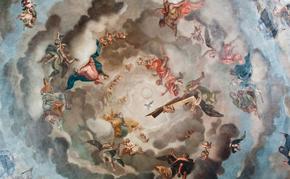The views expressed in our content reflect individual perspectives and do not represent the authoritative views of the Baha'i Faith.
Growing up in Iran, and as a Baha’i, Naw-Ruz was always the most significant celebration of the year for my family—for several reasons.
Every year, a few months before this special celebration, I was excited to go shopping with my parents in order to buy new clothes that I could wear on the day of Naw-Ruz. I also loved setting up our Haft-Sin table—a Persian tradition involving seven symbols of life—and perhaps unsurprisingly, I was thrilled not to have any school or homework for more than two weeks. Families all over the country joined in the festivities, often visiting their relatives and elder family members, and forgetting about any of the past year’s tiffs and miffs, to restore their relationships and friendships.
As a child, Naw-Ruz mostly meant painting eggs for Haft-Sin and receiving gifts from my grandparents. However, when I became older, I learned that Naw-Ruz is rooted in Zoroastrian tradition and is celebrated not only by Iranians, but also by many other ethnicities, and in other countries in the Middle East and Central Asia.
I also learned that Naw-Ruz is not only a holiday of huge cultural significance for some peoples, but it also contains great religious significance for Baha’is, who consider it a holy day marking the beginning of each new year according to the Baha’i calendar. For this reason, Naw-Ruz is consistently and joyfully observed by Baha’is around the world, as a large and festive religious celebration that contains many levels of meaning and therefore many things to celebrate.
Perhaps the most obvious meaning of Naw-Ruz is the inauguration of a new year. Before each Naw-Ruz arrives, my family finds moments to reflect on the year which is drawing to a close, and on that which is about to begin. We ponder what we could have done to enhance the quality of our lives and what plans and resolutions we should make for the future. This reflection is made easier by the fact that Naw-Ruz is preceded by the 19-day Baha’i Fast, in which Baha’is around the world review and meditate on their past year and strive to enhance their spiritual qualities and virtues, such as patience, detachment and steadfastness. During the Fast, Baha’is wake up early in the morning to drink and eat before the sun rises, and my family uses the extra time this provides to recite prayers together, engage in spiritual conversation, study the words of God, reflect on the past year and form intentions and plans for the year to come.
Another meaning of Naw-Ruz, which I equally cherish, is its concurrence with the first day of spring in the northern hemisphere. My spirit finds delight in the way everything in nature begins a new life and becomes reinvigorated at this time: trees blossom, flowers bloom, and the grass grows again, turning fields green.
Furthermore, the physical change, growth and newness of spring is symbolic, for Baha’is, of spiritual regeneration:
The new year hath appeared and the spiritual springtime is at hand. – Abdu’l-Baha, Tablets of Abdu’l-Baha Abbas, p. 318.
What does “spiritual springtime” mean? Since spring is the time of year when all things are renewed, reborn and regenerated, the Baha’i teachings use it as a metaphor for the way in which God sends His messengers and prophets to humanity from age to age, whenever a spiritual renewal is needed. These prophets rearticulate, in each age, the timeless spiritual teachings of the world’s religions (which have often been forgotten), while providing new divine teachings that enable humanity to progress to the next stage in its social and spiritual evolution. Just as the sun revives all physical life in the spring, these divine messengers revive the spiritual life of humanity.
O friends! It behoveth you to refresh and revive your souls through the gracious favors which in this Divine, this soul-stirring Springtime are being showered upon you. The Day Star of His great glory hath shed its radiance upon you, and the clouds of His limitless grace have overshadowed you. – Baha’u’llah, Gleanings from the Writings of Baha’u’llah, p. 94.
Thus, for Baha’is, Naw-Ruz commemorates not only the new year and the delights of spring, but also the joy of having received God’s new message to humanity at this time in its history and development. Abdu’l-Baha wrote:
I wish this blessing to appear and become manifest in the faces and characteristics of the believers, so that they, too, may become a new people, and having found new life and been baptized with fire and spirit, may make the world a new world, to the end that the old earth may disappear and the new earth appear; old ideas depart and new thoughts come; old garments be cast aside and new garments put on; ancient politics whose foundation is war be discarded and modern politics founded on peace raise the standard of victory; the new star shine and gleam and the new sun illumine and radiate; new flowers bloom, the new spring become known; the new breeze blow; the new bounty descend; the new tree give forth new fruit; the new voice become raised and this new sound reach the ears, that the new will follow the new, and all the old furnishings and adornments be cast aside and new decorations put in their places. – Abdu’l-Baha, Tablets of Abdu’l-Baha Abbas, p. 38.
In this spirit, Naw-Ruz is a perfect occasion on which to contemplate how we can strive, day by day, to grow spiritually, serve humanity and endeavor for the betterment of the world.

















Comments
Sign in or create an account
Continue with Facebookor